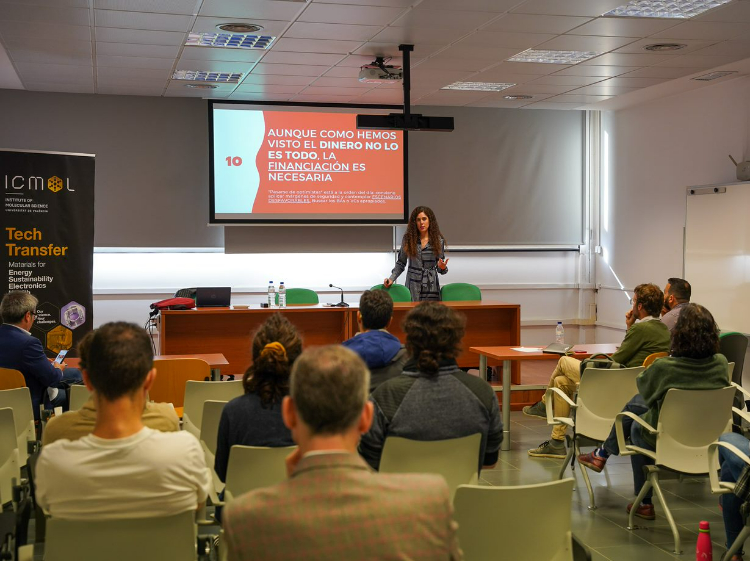
Gómez, with experience in the automotive sector and responsible for the development and management of several companies (3D Surgical Technologies, ICU Medical), explained that the training of the teams, the amount and type of funding needed, the present and future technology, the organisation model of society or regulatory factors often determine the viability of this model of scientific entrepreneurship that arises from university knowledge.
The generation, scaling and consolidation of spin-offs are issues that are at the centre of the debate and of public policies to support science and knowledge transfer, both in Spain and in Europe. In this sense, the #DesayunosICMol are an initiative of the ICMol's Innovation and Knowledge Transfer area that brings together groups and researchers from the institute with companies, organisations and people linked to the R&D&I system.
In these sessions, collaboration opportunities are analysed and the aim is to nurture the seed of scientific entrepreneurship. This was precisely one of Gómez's ideas in his talk, entitled "Keys to success in academic spin-offs", in which he encouraged the researchers present to take the plunge. And he warned: "The objective is not to found the company, but to transfer knowledge and results". This is the most direct way to generate wealth from knowledge.
As for the investment needed, Gómez explained that funding is always necessary, even when working in universities and public centres. "There will always be times when we will need private funding and we must try to have safety margins and consider favourable scenarios, but also the most unfavourable ones", explained Gómez, who has a degree in Mechanical Engineering and a Master's in Industrial Engineering, explained to the researchers the importance of having a business plan and that this "must be a living document that adapts and takes stakeholders into account".
And in relation to team building, he considered it essential that the founding team be made up of people who are "valuable, honest, able to delegate, who can listen like 'sponges' and who are 'aligned' with the objectives of the project". A "fair" remuneration policy should also be foreseen, which could include stock option plans or phantom shores. And finally, he stressed the importance of publicising the project and its evolution: "What is not communicated does not exist," he said.
The #ICMolInnovationBreakfast is an initiative coordinated by ICMol's Transfer and Innovation unit, headed by Manuel Quesada, together with Francisco Marqués and Ruth Manzanares, ICMol's manager. This programme of activities is supported by the Valencian Innovation Agency and the Department of Innovation, Science and University of the Generalitat Valenciana.
"Project co-financed by the European Union through the Operational Programme of the European Regional Development Fund (ERDF) of the Valencian Region 2021-2027".


